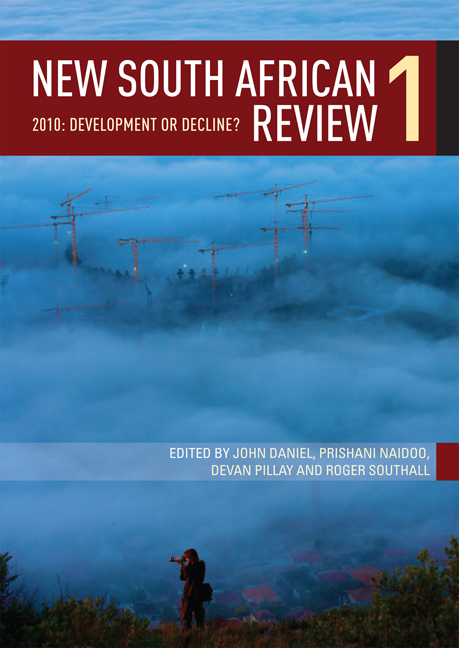Book contents
- Frontmatter
- Contents
- Preface
- Introduction South Africa 2010: From short-term success to long-term decline?
- PART 1 ECONOMY, ECOLOGY AND SUSTAINABILITY
- PART 2 STATE, POLITICS AND POLICY
- PART 3 EDUCATION, HEALTH AND LAND
- INTRODUCTION Reform and redress in higher education, health and land
- CHAPTER 11 ‘Silencing and worse …‘: The humanities and social sciences in South Africa
- CHAPTER 12 Realising transformation, equity and social justice in higher education
- CHAPTER 13 The polarising impact of South Africa's AIDS epidemic
- CHAPTER 14 Health for all? Towards a national health service in South Africa
- CHAPTER 15 The Comprehensive Rural Development Programme (CRDP): A beacon of growth for rural South Africa?
- CHAPTER 16 Breaking down barriers: Policy gaps and new options in South African land reform
- PART 4 Doreen Atkinson
- Contributors
- Index
INTRODUCTION - Reform and redress in higher education, health and land
from PART 3 - EDUCATION, HEALTH AND LAND
Published online by Cambridge University Press: 21 April 2018
- Frontmatter
- Contents
- Preface
- Introduction South Africa 2010: From short-term success to long-term decline?
- PART 1 ECONOMY, ECOLOGY AND SUSTAINABILITY
- PART 2 STATE, POLITICS AND POLICY
- PART 3 EDUCATION, HEALTH AND LAND
- INTRODUCTION Reform and redress in higher education, health and land
- CHAPTER 11 ‘Silencing and worse …‘: The humanities and social sciences in South Africa
- CHAPTER 12 Realising transformation, equity and social justice in higher education
- CHAPTER 13 The polarising impact of South Africa's AIDS epidemic
- CHAPTER 14 Health for all? Towards a national health service in South Africa
- CHAPTER 15 The Comprehensive Rural Development Programme (CRDP): A beacon of growth for rural South Africa?
- CHAPTER 16 Breaking down barriers: Policy gaps and new options in South African land reform
- PART 4 Doreen Atkinson
- Contributors
- Index
Summary
This section deals with three sectors of South African society – higher education, health and land – which are all widely acknowledged as confronting far-reaching crises. Higher education, perched above a public schooling system which is regularly denounced as failing the nation, is struggling with issues of merger of institutions, rationalisation of resources, and producing qualified graduates from cohorts of students many of whom are desperately underprepared. Public health care – from which a significant minority of better-off South Africans have migrated in favour of a much more highly resourced private health care system – has proved unable to meet the multiple challenges thrown at it during the post-apartheid years, notably that of HIV/AIDS, so that today average life expectancy for South Africans is lower than it was in 1994. Finally, the processes of land reform and restitution have become notorious for having failed to meet their targets and, albeit with important exceptions, for having become ingloriously delinked from the issue of agricultural production. The story in each of these sectors is not, however, nearly as gloomy as the popular media portray it in regular doom-laden reports, for there are silver linings, gleams of light, and promises of positive changes ahead. Nonetheless, the principal worry in each of these sectors is, in essence, South Africa's failure to move significantly away from the divided society of the past; indeed, present policies and processes are, inadvertently, too often reproducing historic inequalities, with all the dangers that holds for the country's already fragile social coherence.
A strong case can be made that, in these and other sectors, many of South Africa's travails are rooted in intellectual failures (to think about radical alternatives): misguided normative assumptions (notably, an uncritical embrace of neoliberal thinking or, indeed, an equally uncritical railing against an often ill-defined evil labelled as neoliberalism); and a post-colonial closing of minds (pursuit of crude ‘transformation’ agendas without regard to or recognition of their opportunity costs). Peter Vale explores the roots of such failures in his wide ranging survey of the historical development and contemporary currents within the humanities and social sciences in South Africa, although doubtless he would want to argue that the intellectual and normative failures which he discusses have a much wider application across South African society.
- Type
- Chapter
- Information
- New South African Review2010: Development or Decline?, pp. 254 - 260Publisher: Wits University PressPrint publication year: 2010



